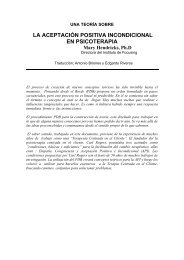8 Focusing en de experiëntiële aspecten van psychotherapie
8 Focusing en de experiëntiële aspecten van psychotherapie
8 Focusing en de experiëntiële aspecten van psychotherapie
You also want an ePaper? Increase the reach of your titles
YUMPU automatically turns print PDFs into web optimized ePapers that Google loves.
Wampold, B.E. (2001). The great psychotherapy <strong>de</strong>bate. Mo<strong>de</strong>ls, methods, and findings. London, UK:<br />
Erlbaum.<br />
Literatuur<br />
Warner, M.S. (1989). Empathy and strategy in the family system. Person-C<strong>en</strong>tered Review, 4, 42-48.<br />
Warner, M.S. (1992). Fragiele process<strong>en</strong>. Psychotherapeutisch Paspoort, 5,105-118.<br />
Warner, M.S. (1997). Does empathy cure? A theoretical consi<strong>de</strong>ration of empathy, processing, and<br />
personal narrative. In A. Bohart & L.S. Gre<strong>en</strong>berg (Red.), Empathy reconsi<strong>de</strong>red: New directions in<br />
psychotherapy (pp. 125-140). Washington, D.C.: American Psychological Association.<br />
Warner, M.S. (1998). A cli<strong>en</strong>t-c<strong>en</strong>tered approach to therapeutic work with dissociated and fragile<br />
processes. In L.S. Gre<strong>en</strong>berg, J.C. Watson, & G. Lietaer (Red.), Handbook of experi<strong>en</strong>tial psychotherapy<br />
(pp. 368-387). New York: Guilford.<br />
Warner, M.S. (2000a). Person-c<strong>en</strong>tred therapy at the difficult edge: A <strong>de</strong>velopm<strong>en</strong>tally based mo<strong>de</strong>l of<br />
fragile and dissociated process. In D. Mearns & B.Thorne, Person-c<strong>en</strong>tred therapy today. New frontiers<br />
in theory and practice (pp.144-171). London: Sage.<br />
Warner, M.S. (2000b). Person-c<strong>en</strong>tered psychotherapy: One nation, many tribes. The Person-c<strong>en</strong>tered<br />
Journal, 7(1), 28-39.<br />
Warner, M.S. (2001). Empathy, relational <strong>de</strong>pth and difficult cli<strong>en</strong>t process. In S. Haugh & T. Merry<br />
(Red.), Rogers’ therapeutic conditions: Evolution, theory and practice. Vol. 2: Empathy (pp. 181-191).<br />
Ross-on-Wye: PCCS Books.<br />
Warner, M.S. (2002). Luke’s dilemmas: A cli<strong>en</strong>t-c<strong>en</strong>tered/experi<strong>en</strong>tial mo<strong>de</strong>l of processing with a<br />
schizophr<strong>en</strong>ic thought disor<strong>de</strong>r. In J.C. Watson, R.N. Goldman, & M.S. Warner (Red.), Cli<strong>en</strong>t-c<strong>en</strong>tered<br />
and experi<strong>en</strong>tial psychotherapy in the 21st C<strong>en</strong>tury: Ad<strong>van</strong>ces in theory, research and practice (pp.<br />
459-472). Ross-on-Wye: PCCS Books.<br />
Watson, J.B. (1925). Behaviourism. New York: Norton.<br />
Watson, J.C., Goldman, R.N., & Gre<strong>en</strong>berg, L.S. (2007). Case-studies in the experi<strong>en</strong>tial treatm<strong>en</strong>t of<br />
<strong>de</strong>pression: A comparison of good and poor outcome. Washington, DC: APA Books.<br />
Watson, J.C., Goldman, R.N. & Vanaerschot, G. (1998). Empathic: A postmo<strong>de</strong>rn way of being? In L.S.<br />
Gre<strong>en</strong>berg, J.C. Watson & G. Lietaer (Red.), Handbook of experi<strong>en</strong>tial psychotherapy (pp. 61-81). New<br />
York: Guilford.<br />
Watson. J.C., Gordon, L., Stermac, L., Kalogerakos, F., & Steckley, P. (2003). Comparing the effectiv<strong>en</strong>ess<br />
of process-experi<strong>en</strong>tial with cognitive-behavioral psychotherapy in the treatm<strong>en</strong>t of <strong>de</strong>pression.<br />
Journal of Consulting and Clinical Psychology, 71, 773-781.<br />
Watson, J.C., & Gre<strong>en</strong>berg, L.S. (1996). Emotion and cognition in experi<strong>en</strong>tial therapy: A dialecticalconstructivist<br />
position. In H. Ros<strong>en</strong>. & K. Kuelwein (Red.), Constructing realities: Meaning-making<br />
perspectives for psychotherapists (pp. 253-276). San Francisco: Jossey-Bass.<br />
Watson, J.C., Gre<strong>en</strong>berg, L.S., & Lietaer, G. (1998). The experi<strong>en</strong>tial paradigm unfolding: Relationship<br />
and experi<strong>en</strong>cing in therapy. In L.S. Gre<strong>en</strong>berg, J. Watson & G. Lietaer (Red.), Handbook of experi<strong>en</strong>tial<br />
psychotherapy (pp. 3-27). New York: Guilford.<br />
Watson, J.C. & Steckley, P. (2001). Pot<strong>en</strong>tiating growth: An examination of the research on unconditional<br />
positive regard. In J.D. Bozarth & P. Wilkins (Red.), Rogers’ therapeutic conditions: Evolution,<br />
theory and practice. Vol. 3. Unconditional positive regard (pp. 180-197). Ross-on-Wye, UK: PCCS Books.<br />
Watzlawick, P., Beavin, J.H., & Jackson, D.D. (1967/1970). Pragmatics of human communication. A study<br />
of interactional patterns, pathologies, and paradoxes in psychotherapy. New York: Norton [De pragmatische<br />
aspect<strong>en</strong> <strong>van</strong> <strong>de</strong> m<strong>en</strong>selijke communicatie. 1970. Dev<strong>en</strong>ter: Van Loghum Slaterus].<br />
641










